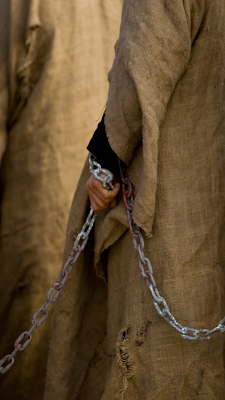The History of Islamic Violence, Enslavement, and Ransom is Important for People to Know About
Tuesday
"What do you mean?" I asked.
He said, "Algiers used to be a French colony, so of course, a lot of the Muslims there could speak French, and since it was a colony, the French said anybody from Algiers could move to France. So now they have a huge Muslim population."
I thought this was a good opportunity to add some history. I think Islam's contact with the West down through history is important for people to know because many people still think of Islamic "extremism" as a modern phenomenon. Whenever someone brings up a recent news story involving Islamic violence, I try to think of some way to add a little historical context. So I asked, "Do you know why Algiers became a French colony? It's an interesting story."
Everyone likes an interesting story. I was talking to three people. I had their attention. "Have you ever heard of the Barbary Coast Pirates?" I was surprised when everybody said no. "They were Muslim countries along the Mediterranean coast of north Africa — Tunisia, Algiers, Morocco, and Tripoli (now known as Libya) — that captured ships doing business in the Mediterranean and took the ship, stole the cargo on board, and sold the crew into slavery. They did this for hundreds of years. And when a country complained, they said, 'If you pay us a yearly tribute, we will not attack ships from your country.' Many countries paid this tribute. It was cheaper than war. And paying the tribute effectively allowed them to harass their fellow European countries (their economic competitors) without being blamed for it. The United States didn't have a navy to protect their merchant ships, so they paid the tribute too.
"Of course all this tribute money made the Barbary Pirates more powerful. But when Jefferson became president, the U.S. built a navy and defeated Tripoli. It was the beginning of the end of the whole Barbary racket. Eventually the British, the Dutch and the French brought their own navies to bear on the Barbary coast, and the pirate raiding by these Muslim countries slowed down. Algiers was the last one still doing it, so France completely conquered Algiers and made it into a colony."
Sometimes I get on a roll, and while I had them all in rapt attention, something else occurred to me. "Do you know why Jefferson was so decisive about this? That's another interesting story."
None of them knew the answer and they all looked like they wanted to know, so I said, "Back before he was President, he was an ambassador to France and he found an opportunity to speak with the ambassador from Tripoli, and he asked him, 'Why does your country attack our ships? We have no hostility with your nation.'
"The Tripoli ambassador was honest. He said, 'It is written in our Koran that we must attack and enslave any country that doesn't acknowledge the sanctity of our Prophet.'
"After that conversation, Jefferson bought a Koran and read it. And he realized that there is no bargaining with these people. There is no such thing as peaceful coexistence or mutually beneficial commerce unless you come to them from a position of power. So when he became president, he put a stop to the tribute for good by force."
At this point, we had to get back to work, so the conversation ended.
Telling interesting historical facts like this, without being too heavy-handed with the Islamic doctrine, allows people to slowly come to realize the truth about Islam, without me ever getting into an argument with them about it. They come to their own conclusions. Historical tidbits like these make the task a whole lot easier.
- Read more about the Barbary Coast Pirates here.
- Read more about Jefferson's Koran reading project here.
- Read another conversation I had with someone and used the same information in a different way.


